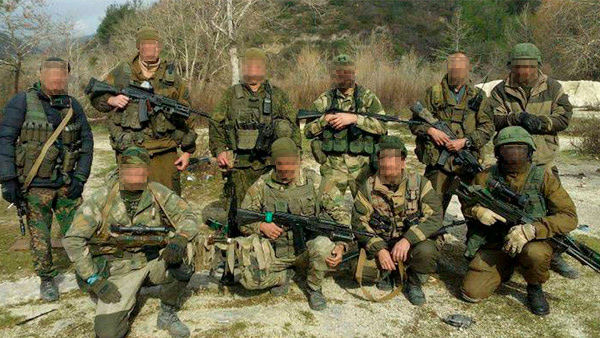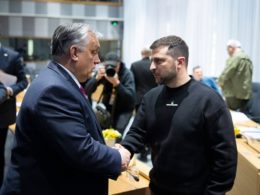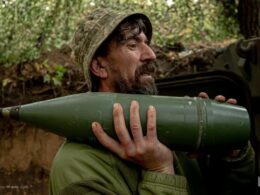On 25 November, the European Parliament adopted n a non-binding resolution welcoming imminent EU sanctions against the Wagner Private Military Company (PMC), with 585 voting for, 40 against, and with 43 abstentions, reported RFE/RL European editor Ricard Jozwiak. The resolution called upon partner countries to adopt similar sanctions, particularly the African Union.
In its resolution, the European Parliament condemned the crimes of the Wagner Group and related private military entities and underlined that the Russian State bears responsibility for them, therefore they should be treated as Russian proxies. It also called upon the European External Action Service to prepare a report on the Wagner Group "which would then help to ensure accountability for their various crimes and pave the way to prosecute these perpetrators in front of international tribunals."
Moreover, it urged Russia, Türkiye, and the United Arab Emirates to withdraw their foreign fighters from Libya, and urged Russia to withdraw foreign mercenaries from eastern Ukraine and Crimea. It also urged the Central African Republic and Mali to cut ties with the Wagner Group.
It also welcomed the imminent adoption of targeted EU sanctions against individuals and entities affiliated with the Wagner Group, using existing EU sanctions regimes such as the EU Global Human Rights Sanctions Regime, called for these sanctions to include travel bans and assets freezes on Wagner operatives, and for similar sanctions to be developed against similar PMCs.
As reported by Ukrinform
, during debates, MP Andrius Kubelius, one of the co-authors of the report, declared that the European Union must conduct a full investigation into the criminal activities of the so-called Wagner Group and initiate international law that will bring the Russian Federation, which created and finances this "private" military company, to account for these crimes.
"Everyone knows what the Kremlin's Wagner Group is, what war crimes they have committed in the Crimea, Donbas, Syria, Libya, the CAR and elsewhere: torture, murder, sexual violence, mass executions, enforced disappearances. So far, no one has been brought to international responsibility for this… That is why it will be very important after the resolution is adopted to continue the work of the European Parliament and other EU institutions to advise this formation," said the European politician.
Wagner mercenaries: what we know about Putin’s private army in Donbas
"This is a shadow organization created by the Kremlin, a military force, with clear signs of a gangster group in all its activities. Such government-controlled shadow organizations are not subject to conventions prohibiting mercenary activities or any other international regulatory rules applicable to private security companies," Kubilius added.
Russia recruited over 5,000 mercenaries to fight in its wars abroad, SBU says
In order to find a way to overcome such legal uncertainty, he suggested four concrete steps to be taken by the EU and its institutions:
- conducting a full investigation into the Wagner Group;
- defining the actions of the Wagner Group as the activities of a criminal gangster organization created and financed by the state;
- creating international legislation that will determine the responsibility of state institutions involved in the formation of such groups as the Wagner Group;
- developing international legislation that will purposefully prosecute the activities and crimes of criminal gangs such as the Wagner Group.
According to Sven Mixer, a member of the European Parliament (Estonia), during the discussion of the draft resolution, the European Union should demand that third countries using the "services" of Russia's Wagner Group, which is involved in human rights crimes around the world, immediately terminate its contracts.
He stressed that this private military company has a "very close connection" with the Russian leadership.
"This group sends its mercenaries to conflict zones around the world, it is used to hide Russia's involvement in such conflicts and bring it out of responsibility. We must not allow ourselves to be deceived by such actions," said Mixer.
PMC Wagner is a unit of Russian military intelligence, mercs’ IDs show – SBU chief
Russian mercenaries from the Wagner Group are killing Ukrainians in the Donbas for money and stealing the mineral resources of the countries in which they are involved. The EU must respond with tougher measures, said MEP Viola von Cramon (Germany) during the discussion of the draft resolution.
"It's time to talk out loud about mercenaries being paid for murders around the world. 'Our business is death, and business is going well,' were the words on the chevrons of 33 members of the Wagner Group, who were arrested in Belarus last year. Russian mercenaries were going on another 'mission' to Africa. In fact, it was a planned Ukrainian intelligence operation to bring them to justice for the crimes in Donbas," the MEP said, recalling the role of the head of the Office of the President of Ukraine in postponing the operation.
She noted that Russian mercenaries are killing Ukrainians in the Donbas, stealing the mineral resources of the countries in which they are involved, such as Libya. According to the MEP, a close friend of President Putin, Evgeniy Prigozhin, who hires multimillion-dollar contracts for this, is hiring them.
"Ukraine, Syria, Sudan, Mozambique, Libya, the Central African Republic, Venezuela 0- people in these and other countries have suffered from crimes committed by these mercenaries. The EU must respond with tougher measures. To do this, the EU needs to work more closely with NATO allies. Personal sanctions must be applied against all those who engage in this inhuman activity. In this way, we will show the Wagner Group and other similar entities that death is not a business, it is a crime against humanity, and it will have serious consequences for them," said von Cramon.
One week ago, Bellingcat investigative journalists released
an investigation into Ukraine's failed sting operation to arrest Wagner mercenaries in Belarus in June 2020. It found that it failed due to interference from the President's Office. This was confirmed by Ukraine's ex-intelligence chief Vasyl Burba.
After Belarus arrested the 33 Wagner mercenaries, who were consequently sent back to Russia, both Ukrainian President Zelenskyy and his Office chief Andriy Yermak denied that Ukraine had ever planned an operation to arrest Wagner members while Ukrainian journalists accused the president and his entourage of blowing the operation and of treason, citing their sources. However after Bellingcat started researching the matter, President Zelenskyy changed his tone and admitted that the operation existed, but Ukraine was "drawn in" by other countries. Ukrainian activist groups have called for President Zelenskyy to dismiss his Head of Office Andriy Yermak.
Related:
- Wagner operation was indeed postponed on Ukraine president’s behalf, ex-intelligence chief says
- Bellingcat finds Ukraine’s Wagner sting operation failed due to President’s Office interference
- Ukrainian president admits special op to detain Wagner mercenaries existed, tells Ukraine was “drawn in” by other countries
- Wagner in Belarus: Ukrainian journalists cry treason as high officials suspected of blowing MID special op
- Ukraine names over 150 mercenaries from “Putin’s private army” fighting in Ukraine and Syria
- Russia recruited over 5,000 mercenaries to fight in its wars abroad, SBU says
- PMC Wagner is a unit of Russian military intelligence, mercs’ IDs show – SBU chief
- New footage shows Russian PMC Wagner involved in crucial 2015 Debaltseve battle in Ukraine





